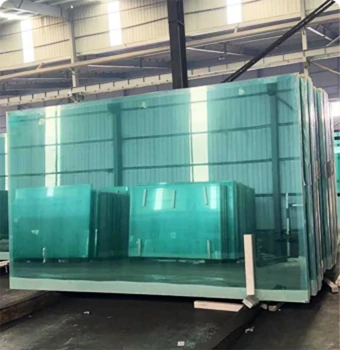Understanding Tempered Glass Meaning, Benefits, and Applications
Tempered glass, also known as toughened glass, is a type of safety glass that has been mechanically or chemically treated to enhance its strength compared to standard glass. This process involves heating the glass to high temperatures and then cooling it rapidly, which creates a balance of internal stresses within the glass that significantly improves its durability and resistance to breakage. The meaning of tempered glass is rooted in its ability to endure impacts and thermal fluctuations, making it a preferred choice in various applications.
The Process of Tempering
The tempering process begins with the selection of high-quality float glass. The glass is heated in a specialized furnace to temperatures of about 620 to 675 degrees Celsius (around 1,148 to 1,247 degrees Fahrenheit). Once the glass reaches the desired temperature, it is quickly cooled using air jets. This rapid cooling causes the outer surfaces of the glass to harden faster than the interior, resulting in a balance of tension and compression. The outcome is a glass that is not only stronger but also less likely to break into sharp shards if shattered, minimizing the risk of injury.
Advantages of Tempered Glass
1. Increased Strength Tempered glass is up to five times stronger than standard glass of the same thickness. This makes it ideal for environments where safety and durability are paramount.
2. Safety Features When tempered glass does break, it shatters into small, blunt pieces rather than sharp shards, reducing the likelihood of serious injuries.
3. Thermal Resistance The heat-strengthening process allows tempered glass to withstand significant temperature fluctuations. This makes it suitable for applications that involve exposure to high heat or varying weather conditions.
tempered glass meaning
4. Versatility Tempered glass can be used in a plethora of applications, including shower enclosures, glass doors, partitions, balustrades, and even in automotive windshields.
5. Aesthetic Appeal Aside from its strength, tempered glass offers clear visibility and can enhance the aesthetic value of structures, making it a popular choice for modern architectural designs.
Applications of Tempered Glass
Tempered glass boasts a wide range of applications across numerous industries. In residential construction, it is commonly used in shower doors, bathroom enclosures, and glass railings. In commercial settings, tempered glass can be found in storefronts, office partitions, and facades. Its strength and safety features make it an excellent choice for tabletops and countertops as well.
In the automotive industry, tempered glass is often used for side and rear windows due to its increased strength and safe shattering properties. Similarly, in the aviation sector, tempered glass is crucial in cockpit and passenger windows to withstand pressure differences while ensuring safety.
Conclusion
In summary, the meaning of tempered glass encompasses a type of safety glass that is engineered for enhanced strength and thermal resistance. Its manufacturing process not only makes it an exceptionally durable material but also ensures that it poses less risk to human safety in the event of breakage. With its diverse applications, tempered glass serves as a critical component in modern architecture, automotive design, and various other fields, standing testament to the balance of functionality and aesthetic appeal. Whether in a home, office, or vehicle, tempered glass provides safety, beauty, and reliability, solidifying its place as a favored choice among builders, designers, and manufacturers alike.
 Afrikaans
Afrikaans  Albanian
Albanian  Amharic
Amharic  Arabic
Arabic  Armenian
Armenian  Azerbaijani
Azerbaijani  Basque
Basque  Belarusian
Belarusian  Bengali
Bengali  Bosnian
Bosnian  Bulgarian
Bulgarian  Catalan
Catalan  Cebuano
Cebuano  Corsican
Corsican  Croatian
Croatian  Czech
Czech  Danish
Danish  Dutch
Dutch  English
English  Esperanto
Esperanto  Estonian
Estonian  Finnish
Finnish  French
French  Frisian
Frisian  Galician
Galician  Georgian
Georgian  German
German  Greek
Greek  Gujarati
Gujarati  Haitian Creole
Haitian Creole  hausa
hausa  hawaiian
hawaiian  Hebrew
Hebrew  Hindi
Hindi  Miao
Miao  Hungarian
Hungarian  Icelandic
Icelandic  igbo
igbo  Indonesian
Indonesian  irish
irish  Italian
Italian  Japanese
Japanese  Javanese
Javanese  Kannada
Kannada  kazakh
kazakh  Khmer
Khmer  Rwandese
Rwandese  Korean
Korean  Kurdish
Kurdish  Kyrgyz
Kyrgyz  Lao
Lao  Latin
Latin  Latvian
Latvian  Lithuanian
Lithuanian  Luxembourgish
Luxembourgish  Macedonian
Macedonian  Malgashi
Malgashi  Malay
Malay  Malayalam
Malayalam  Maltese
Maltese  Maori
Maori  Marathi
Marathi  Mongolian
Mongolian  Myanmar
Myanmar  Nepali
Nepali  Norwegian
Norwegian  Norwegian
Norwegian  Occitan
Occitan  Pashto
Pashto  Persian
Persian  Polish
Polish  Portuguese
Portuguese  Punjabi
Punjabi  Romanian
Romanian  Russian
Russian  Samoan
Samoan  Scottish Gaelic
Scottish Gaelic  Serbian
Serbian  Sesotho
Sesotho  Shona
Shona  Sindhi
Sindhi  Sinhala
Sinhala  Slovak
Slovak  Slovenian
Slovenian  Somali
Somali  Spanish
Spanish  Sundanese
Sundanese  Swahili
Swahili  Swedish
Swedish  Tagalog
Tagalog  Tajik
Tajik  Tamil
Tamil  Tatar
Tatar  Telugu
Telugu  Thai
Thai  Turkish
Turkish  Turkmen
Turkmen  Ukrainian
Ukrainian  Urdu
Urdu  Uighur
Uighur  Uzbek
Uzbek  Vietnamese
Vietnamese  Welsh
Welsh  Bantu
Bantu  Yiddish
Yiddish  Yoruba
Yoruba  Zulu
Zulu 

